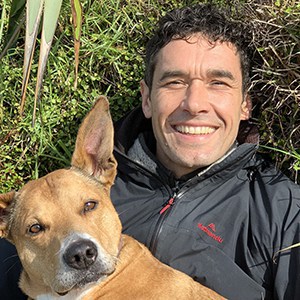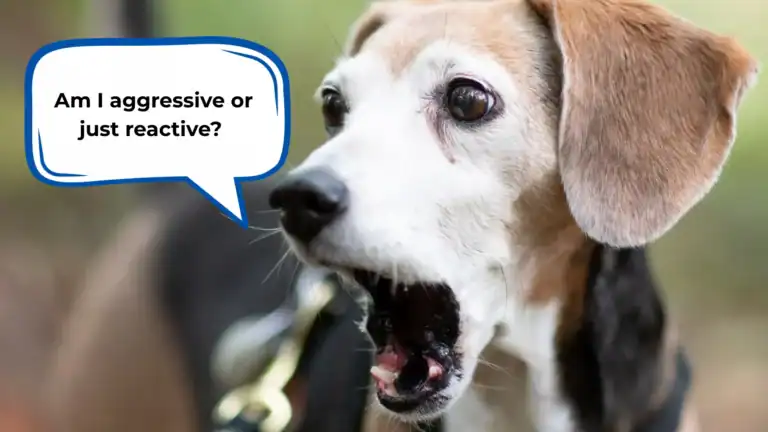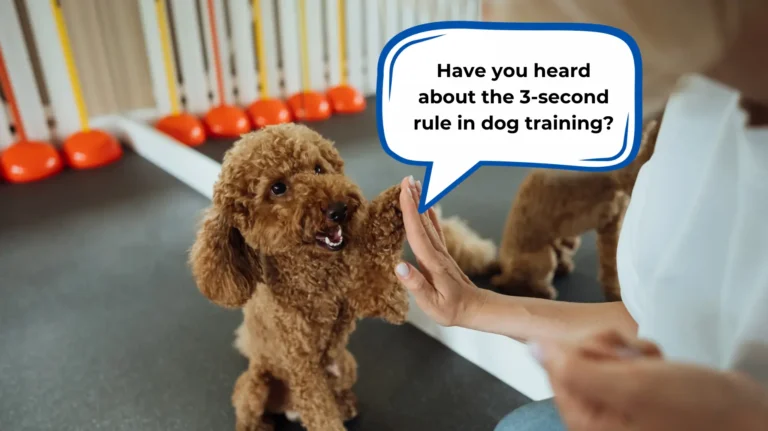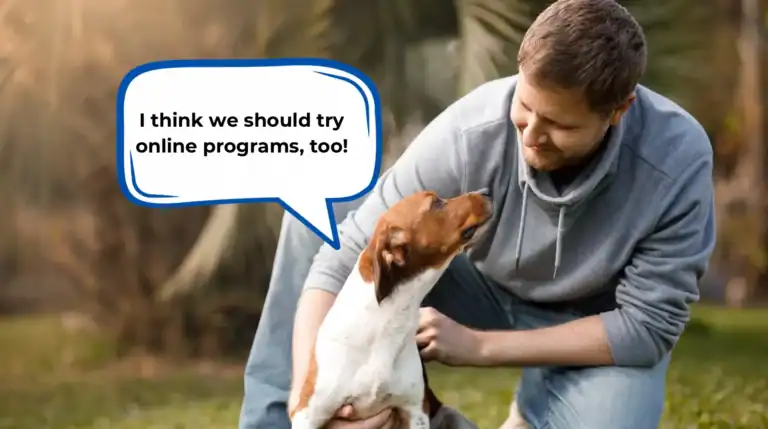If you're wondering, “Why is my dog growling at nothing at night?” this blog will help you understand the root causes and how you can effectively calm your nighttime growler.
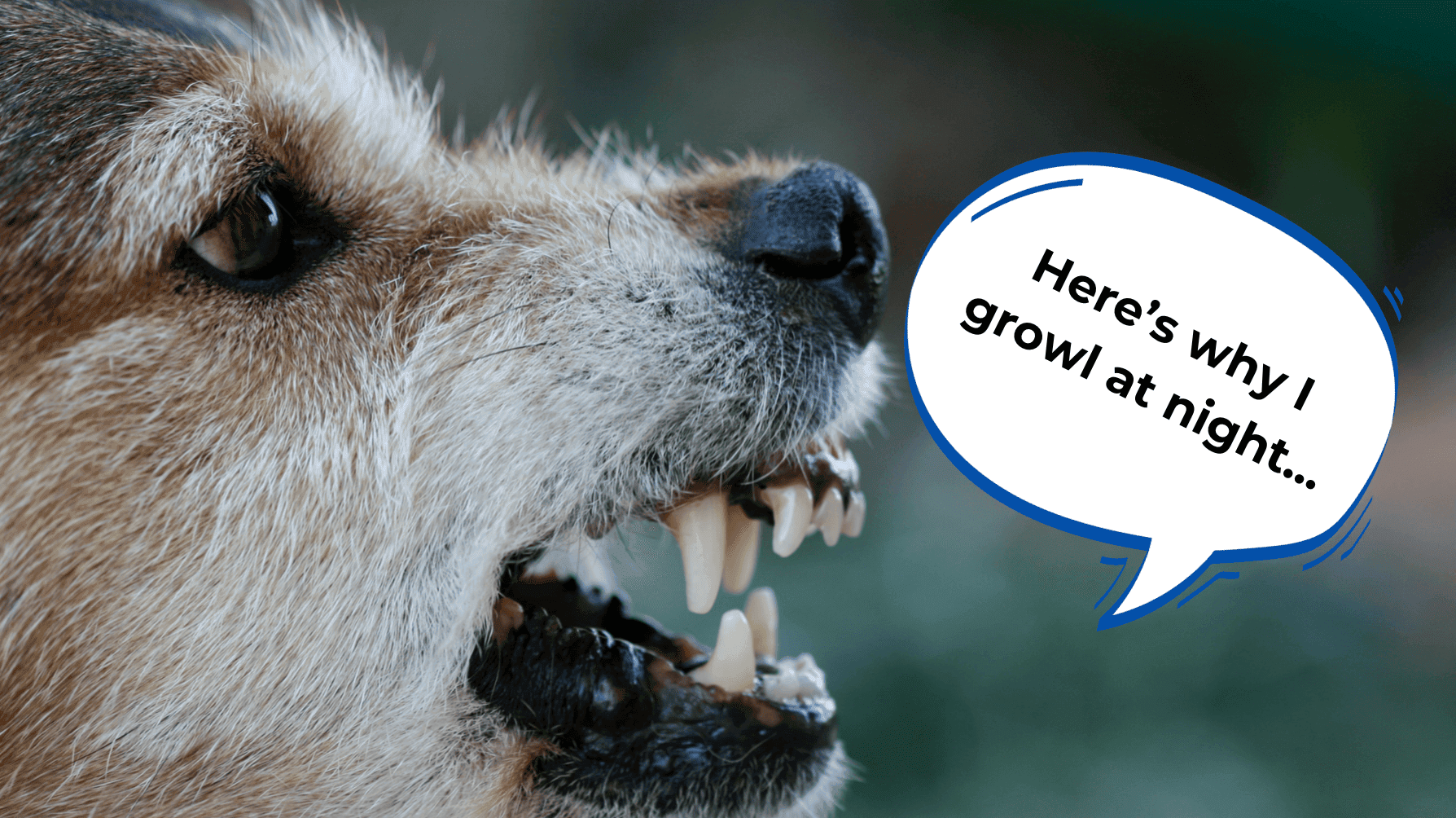
Now, it might seem like your dog growls at nothing, but there could be more to it than meets the eye.
Is your dog feeling stressed? Are they in pain? Or maybe there's something outside that's got them on alert?
It's time to figure out what's really going on and how you can help them (and yourself) get a better night's sleep.
Let’s dive in.
Key Takeaways
- Why Your Dog Growls at Night: Your furry friend might be growling, whining, or barking due to various reasons. They could be feeling scared or anxious, especially in a new environment or if they're a young pup. Their senses are super sharp, so they might be reacting to sounds or smells we can't even detect. They might be uncomfortable, maybe their bed isn't cozy enough or they're feeling under the weather. Or, they could simply be feeling lonely or protective of their territory.
- How to Help Your Dog Sleep Soundly: Make sure your dog has a comfy bed and a safe, quiet space to sleep. If they're new to your home, let them sleep near you at first to feel secure. Show them you're the boss by setting clear rules and boundaries – this can actually make them feel less anxious. If they're barking at every little noise, training techniques can help them relax and feel less alert.
- Become Your Dog's Loving Leader: Dogs are pack animals and need a leader to feel safe. Learn the Five Golden Rules of dog training to establish yourself as the leader and help your dog feel more secure and relaxed.
Table of Contents
Understanding Dog Growling At Night
First of all, the term “growling” is what we’re using in this blog. However, the sounds your dog makes go beyond growling. It could be a whine, a snort, a whimper of discomfort, or a woof escalating to a snarl.
We’re going to look at all these sounds and why your dog is making them.
What I suggest we do at the very start is to understand why your dog growls.
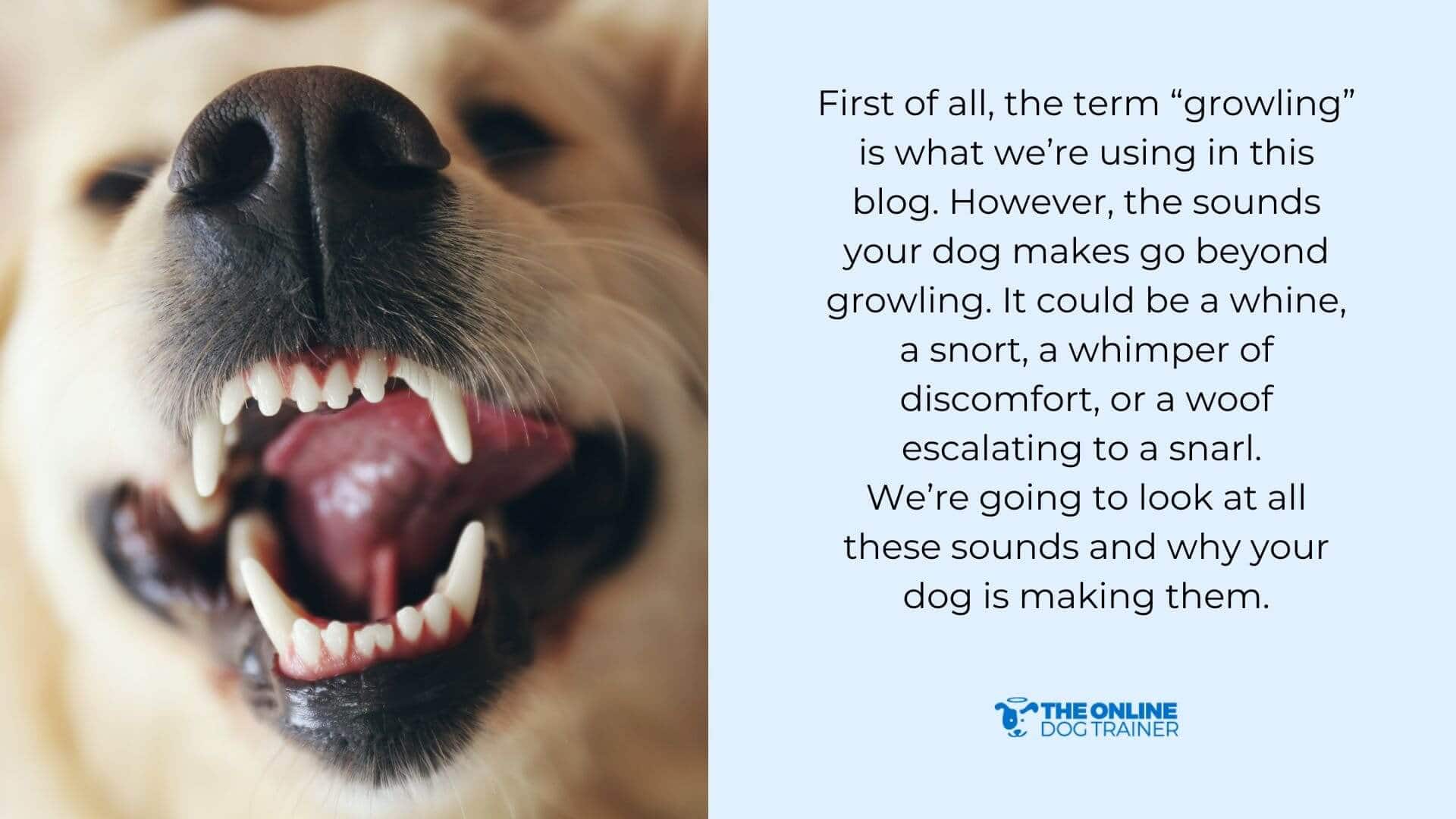
What Does My Dog Want If They’re Growling?
As humans, we use a lot of words to communicate many things. There are also feelings and expressions we show through sounds: we sigh, we go “tut tut,” and even say “Huh?”
These sounds are such a big part of our communication, we instantly understand what they mean.
Just like us, dogs use sounds to communicate their feelings and needs. A sigh, a whimper, or a growl all have different meanings. So, what are they trying to tell you when they have nighttime growling?
Common Reasons Why Dogs Growl at Night
Reason #1: Your Dog Growls Because Of Fear And Anxiety
Your dog, like people, can feel nervous and scared.
A young puppy, or a dog that's recently left their pack might feel particularly unsafe in a new home, especially at night when everything is quiet and unfamiliar.
They might whimper, bark, or even growl at the slightest sound. Most of the time, there's nothing there but the wind rustling the leaves outside.
Your dog's behavior is similar to separation anxiety in humans, where the fear of being alone can trigger feelings of insecurity and panic.
A nervous dog might overreact to any touch or loud noises, like a jumpy person who startles easily. This is because their heightened anxiety puts them in a state of constant alertness. An anxious dog is more sensitive to their surroundings!
Luckily, there are many ways to help your dog feel more secure and relaxed, which in turn can help both of you get a good night's sleep.
After all, a good night's rest can do wonders for dog and owner, reducing stress, improving mood, and promoting overall well-being.
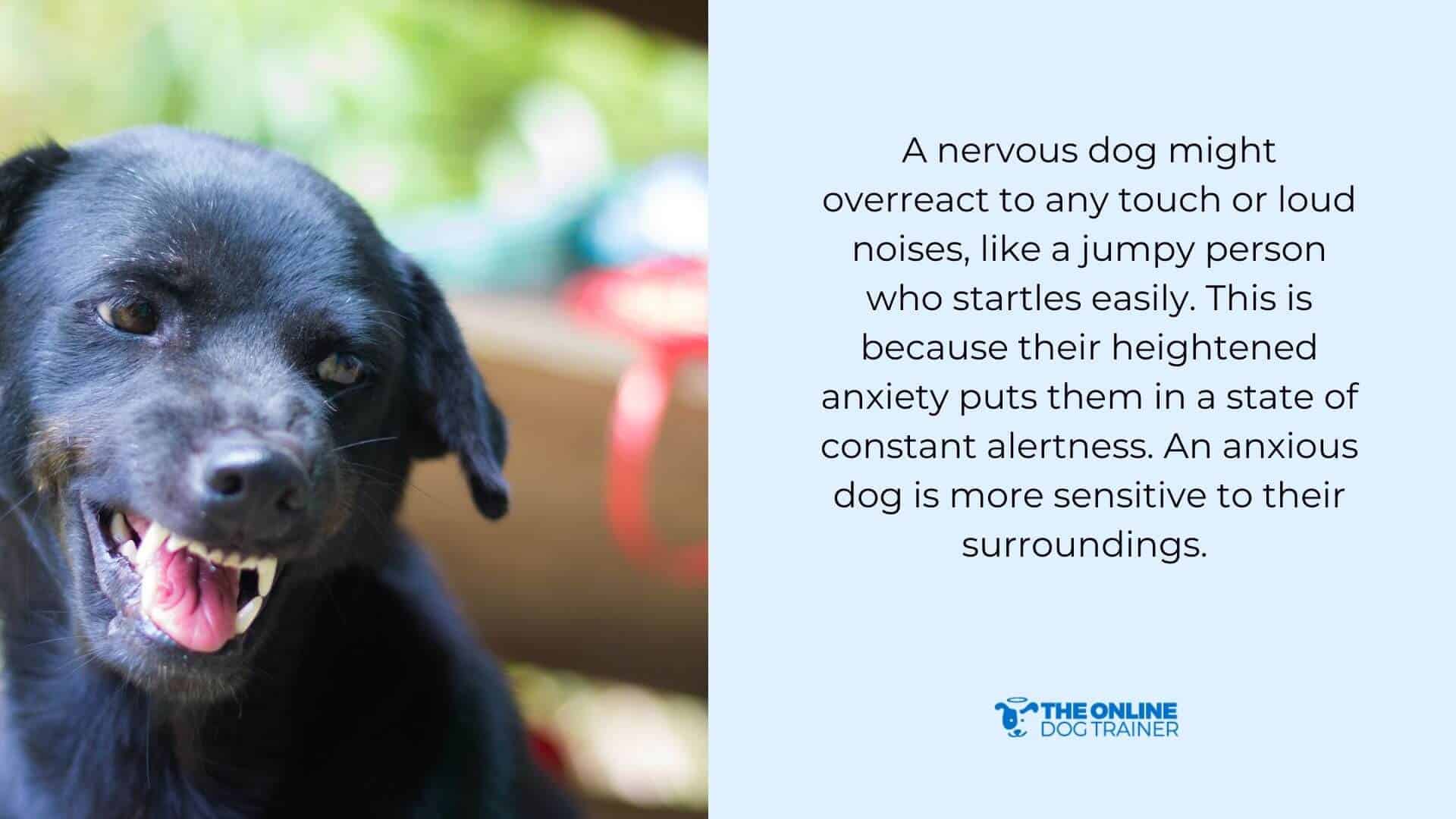
Reason #2: Heightened Senses
The second reason why your dog suddenly starts growling at night is heightened sensitivity to smell, sights, and sound.
Some dogs seem to go on full alert when they sleep, their ears half-cocked, picking up even the faintest noise.. Their hearing and sense of smell are far superior to ours, so even in the dark, they haven't lost their primary senses. They're incredibly sensitive and can react to sounds and smells we can't even perceive.
FREE REACTIVITY MASTERCLASSFor example, I once dropped a tiny piece of orange with a worm in it while I was outside. Later that night, my dogs went out for their last bathroom break and found it. They could identify that tiny piece of fruit or the scent of my fingers from a considerable distance.
A dog's sense of smell and sound are truly remarkable!
So, when we say they're growling at nothing, it's not entirely accurate.
Most dogs are actually hearing or smelling something, and they're simply asking, “What's that?” In a dog pack, just like in a wolf pack, there are always some dogs who are like alarm sounders. These dogs, often the more nervous ones, are more alert and have better hearing.
It's like having a nervous dog with heightened senses in the dark who's always listening for everything. They might make a noise like “ruff,” and that's all it is. It's like they're saying, “What's that? Wake up, guys? Can somebody identify that smell?”
It could be anything from a neighbor cooking dinner, a small rodent scurrying around outside, or the wind blowing.
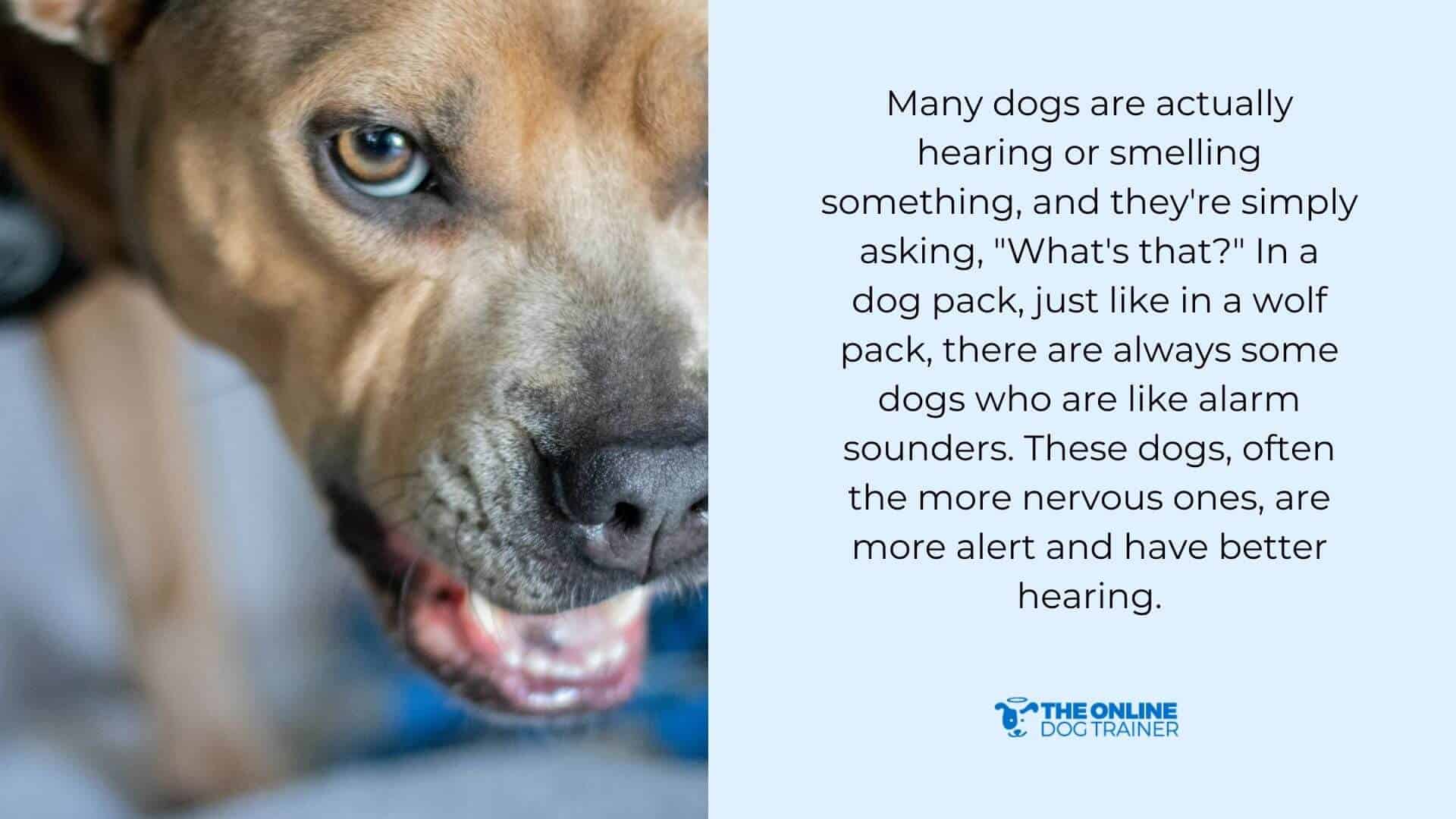
Reason #3: Underlying Medical Issues and Feeling Unwell
Sometimes, your dog starts growling at night because they're not feeling well. This could be physical pain or even emotional distress. It's important to remember that dogs have feelings just like us.
Imagine being given a thin blanket on a cold concrete floor as a bed. You wouldn't feel safe, loved, or comfortable. You wouldn't get a peaceful night's sleep, and every little noise would wake you up.
It's the same for your dog. A comfortable bed can make a big difference to their well-being and sleep, especially if they have health concerns.
GET MY 5 GOLDEN RULES FOR FREE!Reason #4: Discomfort
Your dog's environment plays a big role in their comfort, and therefore, their sleep. If you live in a cold climate, a thick, cozy bed is essential. In a hot climate, your dog might prefer a cool marble floor.
Consider your dog's breed, too. A husky in Arizona will be hot most of the time, while a Vizsla in Alaska will likely be cold. Think about what your dog needs to stay comfortable temperature-wise.
Also, consider their emotional needs. Your pet naturally prefers den-like spaces with only one entrance to guard so they can relax. Just as you wouldn't feel safe sleeping in the middle of a warehouse, your dog might feel more secure in a smaller space like a corner of a room, a crate, or a kennel.
Crates can be especially comforting for your dog because they mimic a den, especially with a blanket draped over the top. They offer a sense of security and protection from drafts.
I always make sure my dogs are warm at night, either with blankets or a little jacket if they get cold. We even leave the fire on sometimes for extra warmth. These small things can make a huge difference to your dog's comfort and sleep.
When your dog is free of physical discomfort, their nighttime growling lessens, too.
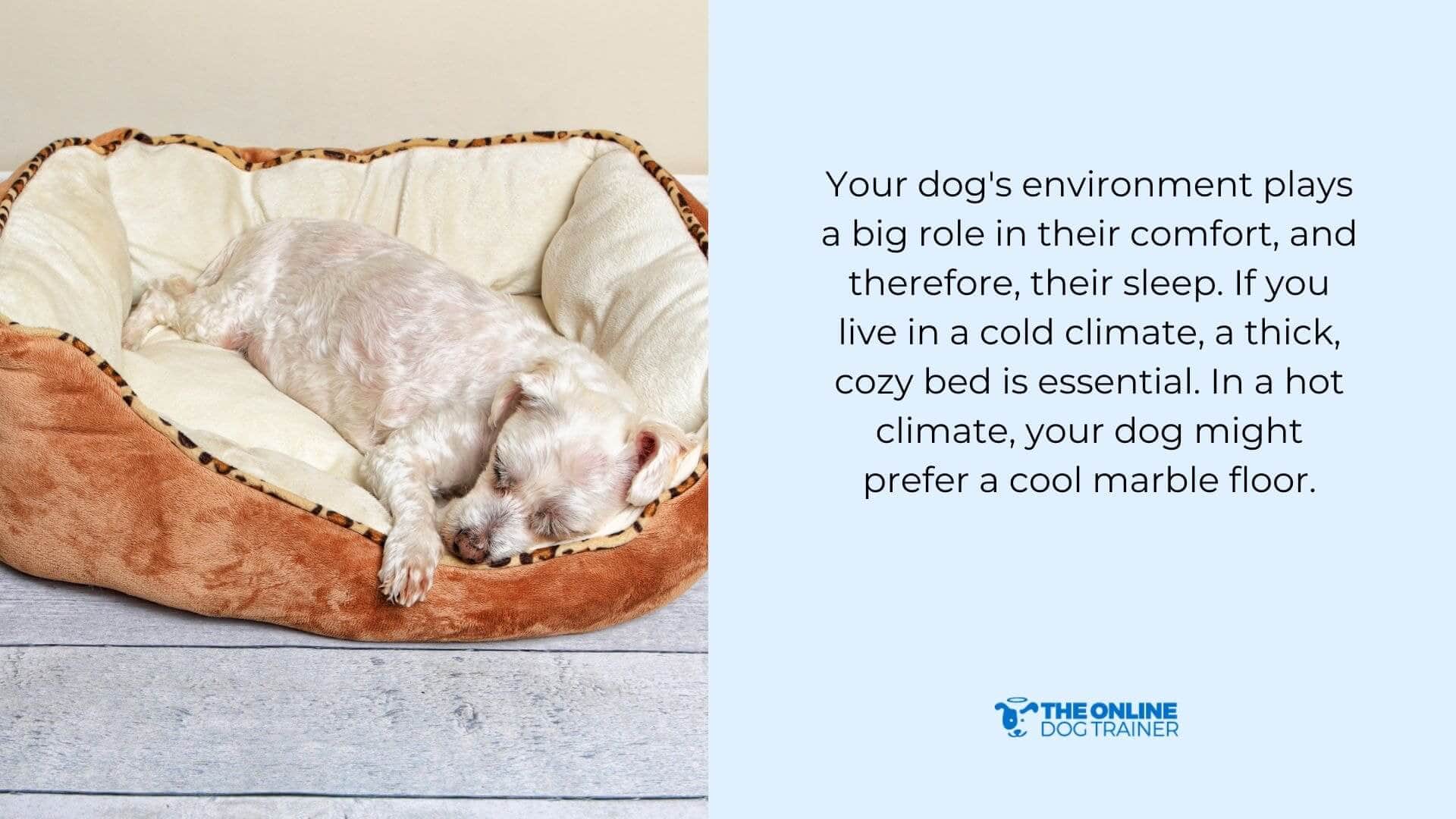
Reason #5: Separation Anxiety
If you've recently brought a dog home from their pack, they might feel lonely and insecure. Letting them sleep in your bedroom for a week or two, then gradually moving them out, can help them adjust. While I don't recommend letting your dog in your bed, having them closer to you can make them feel safer.
Think about where your dog sleeps in the house. Keeping them in a kennel far from the house can feel like isolation for a pack animal who craves companionship. Your dog wants to be close to you, so try to accommodate that.
REACTIVITY SOLVED (NO FOOD, NO FORCE)Reason #6: Territorial Behavior
Dogs are naturally territorial, and this can lead to nighttime growling. Even inside the house, they might hear or smell something outside that they feel is intruding on their territory.
My dog Willow had different growls for the postman, a cat, a deer, or a rat. She even had specific barks for intruders, dinnertime, or when she wanted me to check something out. By learning her language, we understood what she was trying to communicate.
Try to learn your dog's language too. They might be growling because they smell something outside, and that's perfectly normal. The more you show them they don't need to react, the more relaxed they'll become.
Environmental factors like ambient noise, low light, or any changes in the environment can make dogs more vigilant. It could be a windy night, rustling leaves, or even a twig brushing against a window. All these things can contribute to nighttime growling. We need to help our dogs feel safe and relaxed.
Sometimes, our dogs know there's no danger because we're there and have reassured them, but they still feel the need to stay alert for our sake. We need to show them it's okay to relax and let us take charge. It's our responsibility to help them feel safe and secure.
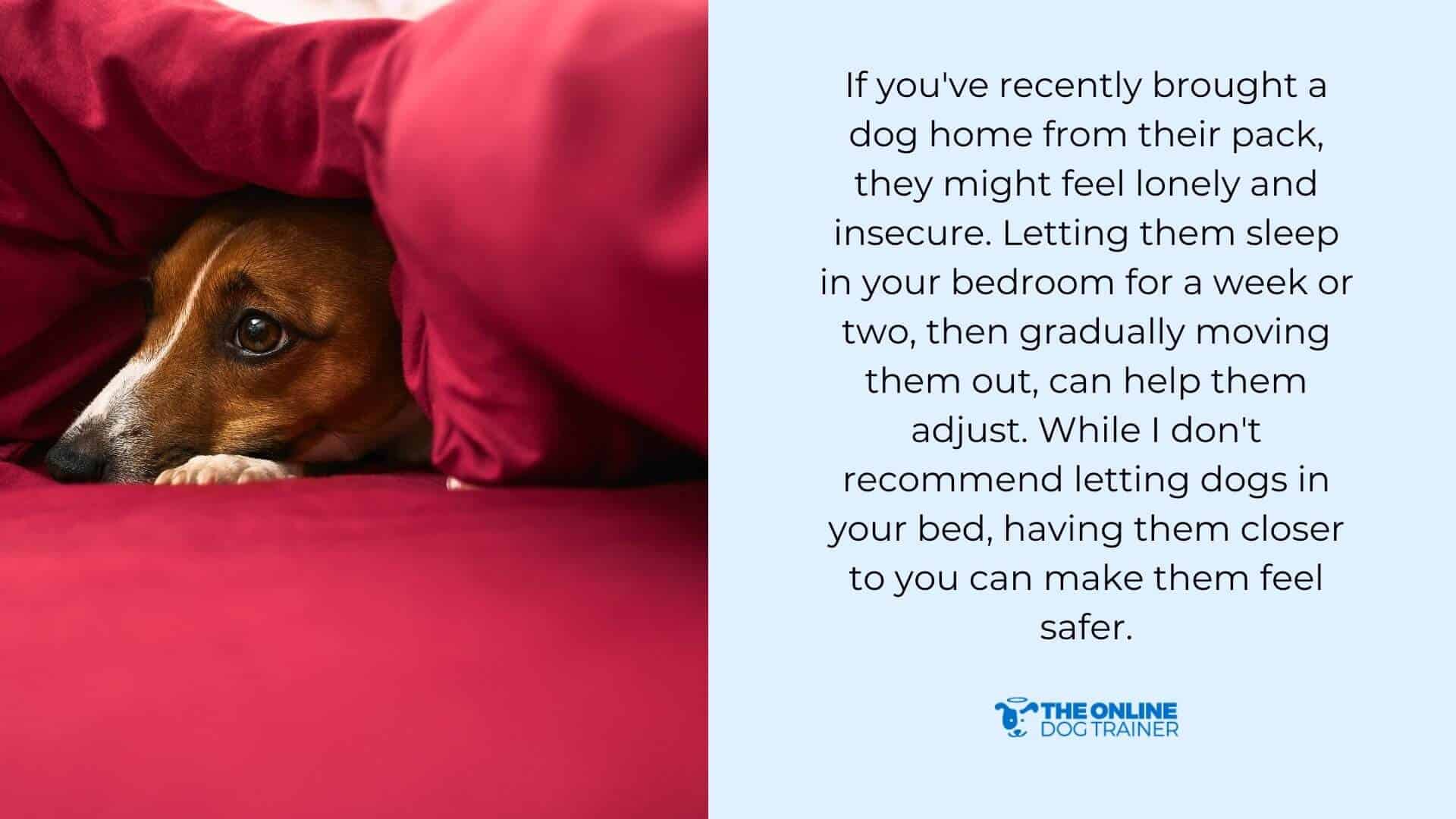
Reason #7: You Haven't Shown Them You're the Pack Leader
Our furry friends are programmed to look for a pack leader. Your dog's natural instinct is to search for leadership in the name of survival. If your dog doesn't see leadership in place, they will assume the role of the leader.
And for your dog, leadership means guarding and protecting you and the property. This is why they're always agitated, anxious, and protective.
“Doggy Dan, are you saying my dog doesn't see me as their leader even if I walk and feed them?”
That is correct. Dog psychology works differently. You have to follow certain rules to help your dogs understand “Hey, I'm in charge here. You can calm down.”
I've taught these rules — I call them The Five Golden Rules — to thousands of dog owners, and they work like magic to change dog behavior. Once these rules are in place, training becomes much easier.
I discuss The Five Golden Rules in my FREE webinar you can join here.
LEARN THE DOG CALMING CODE (FOR FREE)Strategies for Controlling Your Dog's Growling Behavior: Tips From a Professional Dog Trainer
Strategy #1: Create A Safe Space Where They Can Retreat And Feel Safe
Creating a safe and comfortable space for your dog to sleep should be your top priority. Many dogs find comfort in crates. If you can train your dog to use one, leave the door open but drape a blanket over the top and place another inside to make it cozy.
Choose a quiet spot away from drafts and noise, like doors or windows. A good bed, perhaps with a thick mattress, a blanket, and a pillow, can make all the difference. My dogs adore their faux sheepskin beds — they snuggle right in!
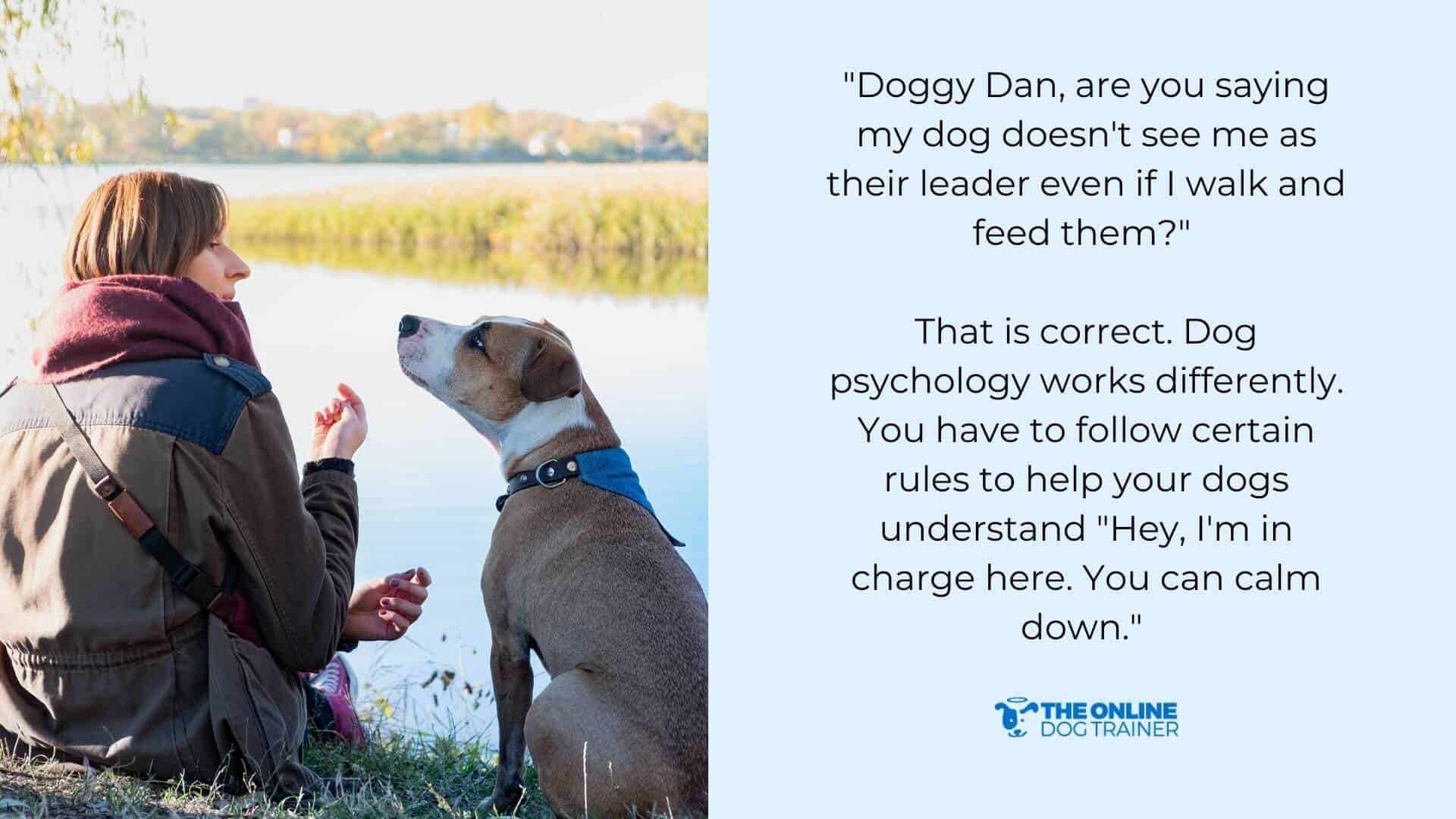
Strategy #2: Train Dogs To Be Calm
Consistent training can help if your dog growls because they think it's expected of them. Teaching your dog to relax is a valuable skill, especially in multi-dog households. My dogs have learned to switch off once they're inside the house.
They lie down and relax, knowing they're safe indoors. You can achieve the same by teaching your dog to be calm and quiet, rewarding good behavior with positive reinforcement, and ignoring unnecessary growling.
JOIN MY FREE REACTIVITY CLASSStrategy #3: Avoid Overfeeding Your Canine Companion At Night
I only feed my dogs in the morning so they're not full before bed. By bedtime, they get a small treat or chew, which helps them relax and settle down. A long walk before bed can also tire them out which makes bedtime easier for everyone.
Strategy #4: Seek Professional Help
If the growling persists, or if there are any signs of illness, consult your vet. Your dog might be growling due to pain, which could be caused by anything from an abscess to a broken nail.
If you've tried everything and the growling continues, consider consulting an animal behaviorist. They have extensive experience with these issues and can offer tailored advice. Some dogs, especially intelligent breeds like sheepdogs, might growl for attention, and a behaviorist can help you address that.
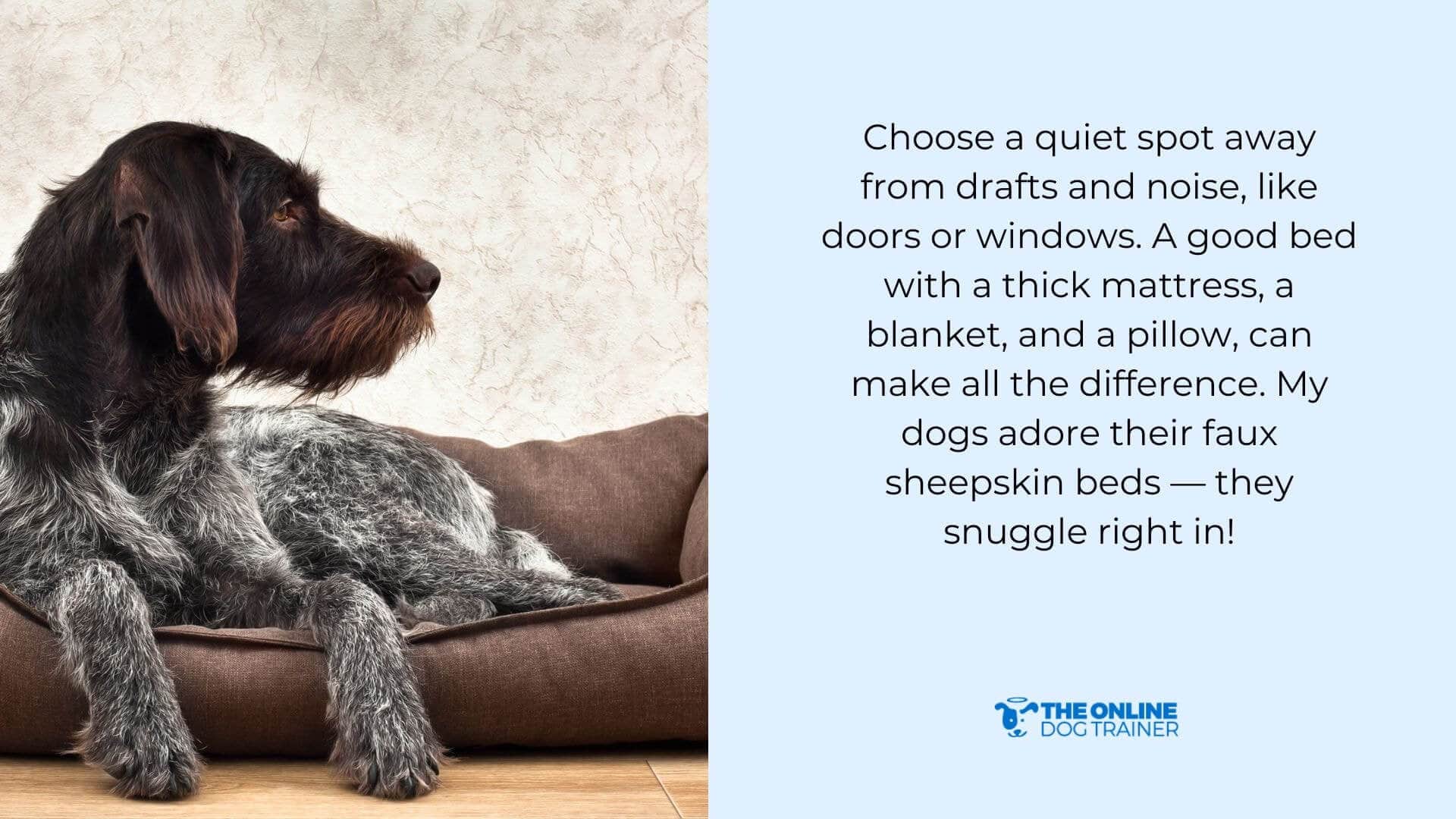
Additional Tip: Observing Your Dog's Body Language While They Growl
Observing their body language is the first step. Dogs communicate a lot through their body.
Look at their ears: are they pinned back in fear or alertly forward?
Is their tail tucked under or held high?
Are their eyes focused or darting?
Do you see bared teeth?
What about their posture — crouched, stiff, or backing away? These signals can reveal how your dog is feeling.
Next, notice when and where aggressive dog growling happens.
Does it occur at a specific time each night? In a particular room or location? For example, if the growling always happens near a window at the same time, it could be due to an animal outside or distant sounds you can't hear.
For example, if the growling always happens near a window at the same time, it could be due to an animal outside or distant sounds you can't hear.
REACTIVITY SOLVED (NO FOOD, NO FORCE)Help Your Dog Overcome Trigger Growling At Night With My Free Reactivity Webinar
In an ideal world, we'd immediately get what our dog wants to say. Unfortunately, it doesn't work like that in real life. We have to truly get what they mean before they make sense.
I want to help you earn the leadership over your dog because if your dog knows they're not in charge, they can chill, and let you handle their perceived threats. You and your dog can enjoy a much calmer sleep at night.
If you want to join my free webinar, register here.
JOIN MY FREE REACTIVITY CLASS
~Doggy Dan


